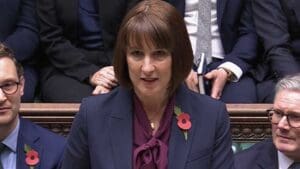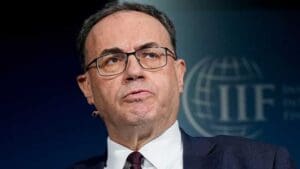
Rachel Reeves first Labour Budget in 14 years in detail
Rachel Reeves announces the first Labour budget in 14 years, and the first to be delivered by a female Chancellor.
Refresh this page as we follow live:
Britain voted for change, she says. The government has a mandate to restore stability and start a decade of renewal, she says.
Reeves says Labour must ‘invest, invest, invest’ to promote growth
The only way to deliver growth is to “invest, invest, invest,” she says.
She says Labour has had to renew Britain before, and it will again.
Reeves says she is setting aside £11.8bn to compensate infected blood victim scandals, and £1.8bn for Post Office scandal victims
Reeves says people can see the problems facing public services. She says:
The country has inherited not just broken public finances, but broken public services too.
The British people can see and they can feel that in their everyday lives: NHS waiting lists at record levels, children in portacabins as school roofs crumble, trains that do not arrive, rivers filled with polluted waste, prisons overflowing, crimes which are not investigated and criminals who are not punished.
She says the last government did not provide funds for services, and for things like compensation scheme (for Post Office operators, and for victims of the blood scandal).
She says Rishi Sunak apologised to the victims of the blood scandal. But he did not budget for compensation, she says.
She says she is setting aside £11.8bn to compensate the blood scandal victims, and £1.8bn for the victims of the Post Office scandal.
Reeves says she is maintaining the Bank of England’s inflation target of 2%.
She thanks Bank of England staff for their help.
And she hanks her predecessors for their advice. Kwasi Kwarteng said in a Mail on Sunday article his mini-budget was not perfect. She agrees, she says.
Inflation is now forecast to be 2.5% this year, and 2.6% next year.
She says she is confirming her economic rules.
The “stability rule” means the government will not borrow to fund current spending.
She says the government will meet this in 2029-30, until that is the third year in the forecast, and then that will be the target for three years ahead, she says.
She says the government is forecast to meet this two years early.
This is from Paul Johnson, director of the IFS: “Current budget balance target by 2029-30 and then target 3 years ahead. Sensible. Current forecast is surplus by 27-28. But only by a small margin (<£10bn) in 2029-30”
Reeves reads out the forecasts for borrowing figures: It is due to fall from 4.5% of GDP this year to 2.1% of GDP by the end of the forecast, she says.
And Reeves reads out the growth figures. They show a faster than expected rise this year and next year, but then weaker than forecast growth later in the forecast:
GDP in 2024: +1.1%, up from 0.8% growth forecast at the March budget
GDP in 2025: +2%, up from 1.9% growth forecast at the March budget
GDP in 2026: +1.8%, down from 2.0% growth forecast at the March budget
GDP in 2027: +1.5%, down from 1.8% growth forecast at the March budget
GDP in 2028: +1.5% down from 1.7% growth forecast at the March budget
GDP in 2029: +1.6%, a new forecast
Reeves says she will soon announce the Covid corruption commissioner.
This is the person tasked with recovering money paid for dodgy Covid contracts. There had been talk that the appointment might be announced today.
And she says David Goldstone is being appointed as chair of the new Office for Value for Money she is setting up.
Reeves says crackdown on welfare fraud will save £4.3bn
Reeves says the government will find savings by reforms to the health and disability benefits system.
And there will be “a crackdown on fraud in our welfare system, often the work of criminal gangs”, using “innovative new methods to prevent illegal activity and provide new legal powers to crack down on fraudsters, including direct access to bank accounts to recover debt”.
She says this should save £4.3bn by the end of the forecast period.
There are also measures to get more people into work, she says.
Reeves confirms the increase in the national minimum wage announced yesterday.
Turning to carer’s allowance: She says the government is increasing the amount people can earn before they lose the benefit. It will rise to the equivaleny of more than £10,000 a year, she says. She says this is “the largest increase in carers allowance since it was introduced in 1976”.
She says the government is also reviewing what is happening to overpayments.
Reeves says the state pension will rise by up to £470.
We want to give retired workers the long-term financial security they need.
That’s why in 2025-26 we’re increasing the State Pension by up to £470 in line with the Triple Lock. — HM Treasury (@hmtreasury) October 30, 2024
Reeves says she has decide to continue the freeze in fuel duty. This will cost almost £3bn, she says.
The government will protect working people and those in local communities by freezing fuel duty next year.
This is a tax cut worth £3bn and will save motorists almost £60 a year. — HM Treasury (@hmtreasury) October 30, 2024
Reeves says employers’ national insurance going up to 15%, and threshold falling, raising £25bn a year
Reeves says she is not increasing income tax, employees’ national insurance and VAT.
But she will increaser employers’ national insurance, she says. It will go up by 1.2 percentage points, to 15%, from April next year, she says.
And she says she is reducing the threshold at which it gets paid. This will come down from £9,100 per year to £5,000.
Reeves says this will raise £25bn a year by the end of the forecast period.
This will raise £25bn per year by the end of the forecast period.
Read more:
Rachel Reeves first Labour Budget in 14 years in detail


